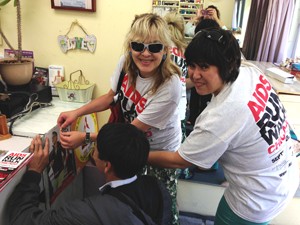
Although NGOs in Kazakhstan have done much to address injustices against persons living with HIV, high levels of social stigma and institutional discrimination persist. Moreover, despite rapid economic development, there is inadequate political commitment, leadership and fiscal support for programs for people living with HIV (PLHIV).
Temirtau, a city in central Kazakhstan, is the center of the HIV epidemic in the country and home to Yelena Bilokon, who leads the NGO Moi Dom, which means "My Home." Since 2010, Bilokon has been an advocate for PLHIV and their families, injecting drug users, and former prisoners. Moi Dom provides peer-to-peer counseling, promotes compliance with antiretroviral drug therapy, conducts seminars and trainings, organizes support groups and public outreach campaigns, and operates a shelter/community center for women and children living with HIV.
Bilokon and nine other representatives of NGOs and government AIDS centers took part in a three-week program in July and August 2013 organized by the USAID Community Connections program that introduced the Kazakhstani participants to U.S. best practices in providing services to PLHIV, and advocacy to reduce stigma and discrimination. The study tour was conducted in Chicago, where the group met with a number of organizations and health-care facilities serving PLHIV. They also participated in the AIDS Run Walk conducted annually by the AIDS Foundation.
Inspired by the openness and civic engagement of those she met in the United States, Bilokon organized a round table on civic involvement in social problems for local government officials, community activists and her beneficiaries after she returned to Kazakhstan. The event was designed to raise awareness about addressing stigma and discrimination, stimulate activism, and engage more stakeholders in her work. After the event, Maslikhat Deputy Vladimir Drozdetskiy offered to support Bilokon's plan to open a beauty salon where PLHIV and former drug users with prison records could learn employment skills.
“I want to share my experience to inspire my community and beneficiaries to become more active, change their attitudes and raise our voices for change," said Bilokon.
Bilokon was also interviewed by Vybirai magazine about the concerns and challenges of PLHIV. A woman business leader, Svetlana Zarkirnyak, read the article and made a large donation of household appliances and clothes for women and children living with HIV. The same business leader is also helping to attract further support from the business community.







Comment
Make a general inquiry or suggest an improvement.